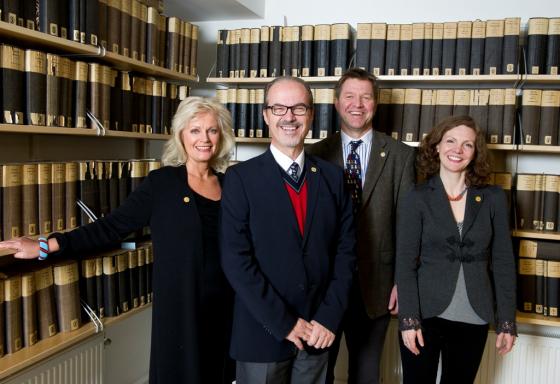Hopes to win election with gender equality
At the University of Bergen, Kuvvet Atakan and his team have made gender equality a key issue in their bid to win the rectorial election.
We promise to make gender equality a high priority if we are elected as the rector team.
This statement by Atakan’s rector team appeared in a letter to the editor in the university’s newspaper På Høyden.
Reaching the target of 50 percent women among new appointments is important to Atakan’s team, who in their letter propose two main measures for achieving gender equality in appointment processes:
- All vacancies for permanent academic positions will be posted in a wide range of forums, including internationally. If the target of at least 40 percent qualified applicants of each gender is not reached on the first attempt, the vacancy must be posted again or the department must submit a well-justified application for dispensation in order to obtain permission to forward the job applications to the hiring committee.
- Teaching, dissemination and administrative experience are key components of an academic position and should be given more weight in the assessment than is currently the case.
“We want a culture of curiosity that reflects a variety of life experiences and perspectives. This is why it’s crucial that researchers and teachers represent the diversity in society with regard to gender, age, ethnicity and other identities,” says Kuvvet Atakan, a candidate in the rectorial election at the University of Bergen.
“Strengthens quality”
This year a new rector will be elected at the University of Bergen (UiB) and the University of Oslo, while a new rector was recently elected at the Norwegian University of Science and Technology and the University of Tromsø. But in the rectorial election at UiB the issue of gender equality is playing a prominent role for the first time, both in the letter to the editor by Atakan’s team and later as the first question in På Høyden’s weekly column “What the rector candidates believe”.
“Why did you write a letter to the editor about gender equality?”
“We think that more gender equality will strengthen the quality of knowledge production, which in fact lies at the heart of the university’s activities. Unfortunately, the focus on gender equality has waned in recent years, so we want to draw more attention to this issue in our campaign,” says Atakan.
“But so far our opponents have not addressed this issue in their letters to the editor,” he states.
The rector team’s commitment to gender equality at the university is related to their own views on knowledge development and is stipulated in the set of values on which their campaign is based.
“We don’t believe that a greater focus on gender equality and measures to promote it will weaken the underlying quality requirements. It’s natural for us to draw attention to the gender imbalance in academia in particular and especially to the lack of female leaders and professors. We think that more female department heads and deans will improve the climate of cooperation and enhance democracy at the university.”
“In our view, a broader recruitment base will improve both research and teaching,” says Atakan.
“Enormous potential for improvement”
Atakan is concerned that the large increase in the number of female students in recent decades is not reflected in a corresponding rise in the number of women in academic positions.
“A rectorial election gives us a good opportunity to conduct a review of the status quo,” he says.
“There is enormous potential for improvement in this area at all Norwegian universities, and UiB is no exception.”
Atakan’s rector team sees great variation among the departments at UiB. Some subjects have made huge strides in the past decade and achieved good gender balance, while others lag far behind.
“If we’re elected, we want to make a concerted effort to improve equality across all dimensions,” says Atakan.
They want to ensure that the concept of equality entails better conditions for all groups of employees, not only between men and women, but gender balance in academic positions and among the academic leadership is an important part of the focus on equality.

Equality in a broader perspective
The other rector team in the election at UiB this spring is headed by Dag Rune Olsen. Olsen thinks the issue of gender equality is self-evident and absolutely central to university policy from day one.
“We agree 100 percent with Atakan, and believe gender equality is crucial for achieving gender balance and for having role models,” he says.
“However,” Olsen continues, “we want to see gender equality viewed in a broader perspective. We are a multicultural university. The university is a global actor and research is international.”
Olsen’s rector team wants to see more academic personnel from all parts of the world at UiB and position vacancies posted internationally. This is also problematic because the gender imbalance is greater among international applicants. However, it is possible to take action to ensure that international appointments do not lead to even less gender balance at the university.
“Position announcements must not be passive. We will cooperate with partners outside of Norway, work with the institutions, perhaps use researchers who used to be at UiB to encourage and motivate more international women to apply for positions with us,” he says.
“Different recipe”
“It’s not controversial to promote gender equality, but we disagree about how to achieve it,” explains Olsen.
According to Olsen, an effective measure would be to announce positions as associate professor rather than professor. Experience shows that this elicits more female applicants and that these women appear to be qualified for promotion faster than their male counterparts. In addition, he thinks that sabbaticals must be used actively in order for women to qualify more quickly for professorships.
“But we don’t support Atakan’s proposals that there must be 40 percent female applicants before we move ahead in the appointment process. At my faculty (editor’s note: Faculty of Mathematics and Natural Sciences) it is common to have 16 percent female applicants. A new position announcement and an entirely new process will be too extensive and not improve the gender balance. Moreover, it’s more important to take action to motivate women to pursue a doctoral degree and an academic career. Only then will more women apply for vacant positions with us. In this work it’s important to have female role models,” says Olsen.
“Will you do like Atakan and write a letter to the editor about gender equality?”
“No, we are not planning to address gender equality in our letters to the editor. On the other hand, we have several specific measures on gender equality in our election platform,” he says.
“What do you think Atakan’s team will gain from this kind of profile?”
”It’s fine to have a gender equality profile, but I believe many people will think that Atakan’s measures to address the problem – such as the requirement of at least 40 percent applicants of each gender – are not right,” says Olsen.
“I don’t think the universities in Norway are so different from each other, but the University of Tromsø is a positive role model in the gender equality field. I don’t think UiB is any better than the other universities in terms of gender equality.”
Translated by Connie Stultz.
In addition to the University of Bergen (UiB), the University of Oslo will elect a new rector this year. The Norwegian University of Science and Technology (NTNU) and the University of Tromsø held their elections earlier this year. The rectorial election at UiB was held from 17 April to 24 April 2013.
Team Atakan: Kuvvet Atakan, Vigdis Broch-Due, Gottfried Greve and Jill Walker Rettberg.
Team Olsen: Dag Rune Olsen, Anne Lise Fimreite, Oddrun Samdal and Anne Christine Johannessen.
Team Olsen won the election for new rectorate. Olsen and his team are officially in place 1 August.

